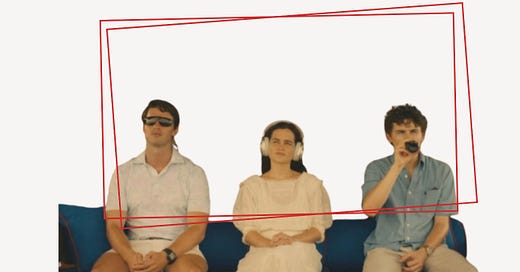If there is one thing I remember doing as a teenager, it’s nothing. And by nothing, I mean literally just hanging out. I grew up in a small village in France, and as you can imagine, there wasn’t much to do. What we did have though was a dormant bus stop—a wooden bench, two windows, and the perfect meeting point for my friends and I.
“On se rejoint à l'arrêt de bus?”
"Shall we meet at the bus stop?” we’d say over the phone.
It didn’t really matter what we were doing. We’d spend entire afternoons pottering about, listening to music and smoking cigarettes. What mattered was seeing each other and catching up.
I miss those teenage years.
I mean that especially in the context of friendship. When was the last time you did nothing with your friends? And when I say ‘doing nothing’, I don’t mean it literally (although why not). I mean having loose plans and not being afraid of doing the simple, everyday stuff together.
As adults meeting up with friends often feels like it needs a purpose that goes beyond simply meeting up. But when I think about my core memories with friends, I often remember long evenings spent chatting around the table or that time we ordered blizzard ice cream and watched TV. According to the experts, unstructured and spontaneous hangouts are crucial for our mental health. Since there is less pressure to perform, there are more opportunities to be authentic (which in turn lowers anxiety and improves self-esteem).
There is an unexpected romance and beauty to be found in the mundane.
Meeting up with friends should free us from stress and expectations. I’ve found that the best way to counter this pressure is to meet at each other’s house or in a place you intentionally decide to meet up every-time. I used to complain about always going to the same place when London has so much to offer. But that specific kind of meet up has a purpose of its own.
I say all this as someone who’s constantly restless—"I need a lot of walking," as my partner puts it. But I’ve also learned about the art of doing nothing. With patience, a close friend showed me how to just be. Without a plan. And the nice thing is, once you’ve unlocked that ability, you can always go back to it. Of course, it’s easier to do nothing in a place where there is nothing to do. In London, it takes discipline.
Lately, I’ve found a new sense of freedom, dictating my own rhythm instead of bending to the city’s. I’ve also been thinking about how casual, mundane hangouts could be the solution to both social burnout and financial strain. Why spend hundreds at a restaurant when cooking together could be just as fulfilling?
So I often try to remember the bus stop.
Whenever I get in the weeds about what to do, with whom, and when, I picture the bus stop. That wooden bench, the two windows, the feeling of being young and unburdened. And I remind myself that it doesn’t matter as much as I think it does. What matters is being present—with my friends, away from my phone, without the need to prove anything.
Simply being is enough, even if the world is constantly trying to convince you otherwise.





